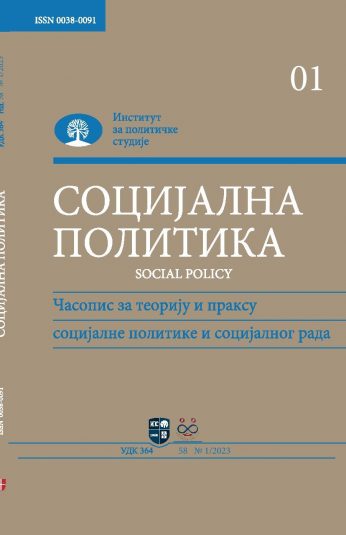Тема броја
СТУДИЈЕ И ОГЛЕДИ
СОЦИЈАЛНА АГЕНДА ЕВРОПСКЕ УНИЈЕ – ПРИМЕНА ОТВОРЕНОГ МЕТОДА КООРДИНАЦИЈЕ У ПОЛИТИЦИ СОЦИЈАЛНЕ УКЉУЧЕНОСТИ
Сажетак
Социјална агенда Европске уније званично је успостављена седницом Европског савета у Лисабону 2000. године уврштавањем области социјалне укључености у координацију националних политика. Широка дивергенција система социјалне сигурности држава чланица отежавала је постизање консензуса о решавању проблема и изазова из ове области. Из тога је проистекла потреба да се, уз очување националних надлежности у области социјалне политике, развије нови механизам координације, другачији од строге законодавне процедуре, чиме је означен настанак Отвореног метода координације као софт методе. Циљеви рада су приказ развоја комунитарне политике социјалне укључености, анализа примене ОМК у овој области, као и истраживање резултата овог процеса на нивоу држава чланица. Кроз анализу развоја социјалне димензије ОМК, улоге актера и процедуралних правила примене метода систематизују се недостаци и предности процеса. Компаративном методом у завршном делу рада установљено је приближавање реформских праваца и исхода политика, уз присутан утицај структурних фактора различитих социјалних модела држава чланица.
Референце
- Вуковић, Дренка, Социјална политика Европске уније, Факултет политичких наука, Београд, 2011.
- Вуковић, Мирјана, „Европска платформа за борбу против сиромаштва и социјалне искључености – садржај и оцене“ у зборнику Ризици и изазови социјалних реформи (приредиле Дренка Вуковић и Наталија Перишић), Факултет политичких наука, Београд, 2012.
- Перишић, Наталија, „Координација политика социјалног укључивања европских држава благостања“, Годишњак Факултета политичких наука 2014, Факултет политичких наука, Београд, бр. 11/2012.
- Agostini, Chiara; Sabato, Sebastiano; Jessoula, Matteo, Work Package 4 – The Europeanization of Active Inclusion Policies, The European Arenas of Active Inclusion Policies, Internet, http://cope-research.eu/wp-content/uploads/2013/05/The_European_Arenas_of_Active_Inclusion_Policies.pdf, 21/07/2014.
- Atkinson, Tony; Cantillon, Bea; Marlier, Eric; Nolan, Brian, Taking forward the EU Social Inclusion Process, An independent report commissioned by the Luxembourg Presidency of the Council of the European Union, Council of the European Union, Luxembourg, 2005.
- Daly, Mary, „Assessing the EU Approach to Combating Poverty and Social Exclusion in the Last Decade“, In: Europe 2020 – Towards a More Social Europe? (eds. Eric Marlier and David Natali), Peter Lang, Brussels, 2010.
- De la Porte, Carolina, The European level development and national level influence of the Open method of coordination: the cases of employment and social inclusion, PHD thesis, European University Institute – Department of Political and Social Sciences, Florence, 2010.
- De la Porte, Carolina, „Is the Open Method of Coordination Appropriate for Organising Activities at European Level in Sensitive Policy Areas?“, In: European Law Journal, Vol. 8, No.1, Blackwell Publishers, Oxford, 2002.
- European Commission, Joint Report on Social Inclusion, Internet, http://ec.europa.eu/transparency/regdoc/rep/1/2001/EN/1-2001-565-EN-F1-1.Pdf, 10/06/2016.
- European Commission, Joint Report on Social Inclusion – Social Security and Social Integration, Internet, http://ec.europa.eu/employment_social/social_inclusion/docs/final_joint_inclusion_report_2003_en.pdf, 10/06/2016.
- European Commission, Social Europe – Current challenges and the way forward, Annual Report of the Social Protection Committee (2012), Internet, ec.europa.eu/social/BlobServlet?docId=9760&, 10/06/2016.
- European Commission, The European Platform against Poverty and Social Exclusion: A European framework for social and territorial cohesion, Internet, europa.eu/social/BlobServlet?docId=6393&langId=en, 11/06/2016.
- Ferrera, Maurizio; Matsaganis, Manos; Sacchi, Stefano, „Модел отворене координације против сиромаштва: Нови процес социјалног укључивања Европске уније“, Ревија за социјалну политику, Правни факултет, Загреб, бр. 2-4/2004.
- Frazer, Hugh; Marlier, Eric, „Strengthening Social Inclusionin the Europe 2020 Strategy“, In: Europe 2020 – Towards a More Social Europe? (eds. Eric Marlier and David Natali), Peter Lang, Brussels, 2010.
- Nelson, Kenneth, „Counteracting material deprivation: The role of social assistance in Europe“, Journal of European Social Policy, Vol. 22, No. 2, 2012.
- Nordic Committee on Social Security Statistics (NOSOSKO), Social Protection in the Nordic Countries 2011/2012 – Scope, Expenditures and Financing, Internet, https://rafhladan.is/bitstream/handle/10802/7818/Social%20Protection%202013.pdf?sequence=1, 10/06/2016.
- Vanhercke, Bart, Social Policy at EU Level: From the Anti-Poverty Programmes to Europe 2020, European Social Observatory Internet, http://www.ose.be/files/publication/2012/Vanhercke_2012_BckgrndPaper_EC_12122012.pdf, 20/07/2014.
- Zeitlin, Jonathan, „Towards a Stronger OMC in a More Social Europe 2020: A New Governance Architecture for EU Policy Coordination“, In: Europe 2020 – Towards a More Social Europe? (eds. Eric Marlier and David Natali), Peter Lang, Brussels, 2010.

